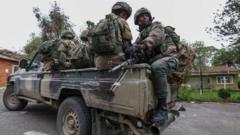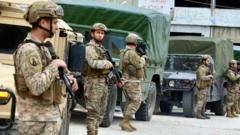The state of emergency was declared due to a surge in gang-related crimes, empowering military and police forces to conduct arrests and searches without warrants while addressing public safety concerns.
Trinidad and Tobago's Government Declares State of Emergency Amid Rising Crime

Trinidad and Tobago's Government Declares State of Emergency Amid Rising Crime
In response to escalating violence and gang activities, Trinidad and Tobago's government announces emergency powers enabling military involvement.
As crime rates soar in Trinidad and Tobago, the government has declared a state of emergency to combat the increasing violence stemming from gang activities, which have become a pressing public health issue. The announcement was made on Monday in the capital, Port of Spain, by Acting Attorney General Stuart Young and National Security Minister Fitzgerald Hinds.
This emergency measure grants military personnel the authority to make arrests and allows law enforcement to search homes without warrants. Additionally, individuals suspected of criminal activities can be stopped and searched by police or soldiers. Despite the urgency, no curfew will be imposed, and citizens will not face restrictions on their movements to avoid further economic disruptions—an approach in stark contrast to conditions during the COVID-19 pandemic.
The country, with a population of approximately 1.4 million, has reported over 620 homicides this year, raising alarms particularly as previous figures have shown its murder rate lingering near that of Haiti's. Hinds characterizes the wave of violence as an epidemic, creating a public health crisis that has led to a disturbing pattern of mass killings—including multiple murders at a time.
The presence of street gangs, which have flourished over the last decade, has become a significant challenge for Trinidad and Tobago. Organized crime researcher Alex Papadovassilakis highlights the detrimental impact of roughly 186 gangs, comprised of over 1,750 members, that engage in drug dealing and arms trafficking, often resorting to extreme violence. As authorities grapple with this severe security dilemma, the state of emergency marks their latest effort to restore safety and order in the nation.
This emergency measure grants military personnel the authority to make arrests and allows law enforcement to search homes without warrants. Additionally, individuals suspected of criminal activities can be stopped and searched by police or soldiers. Despite the urgency, no curfew will be imposed, and citizens will not face restrictions on their movements to avoid further economic disruptions—an approach in stark contrast to conditions during the COVID-19 pandemic.
The country, with a population of approximately 1.4 million, has reported over 620 homicides this year, raising alarms particularly as previous figures have shown its murder rate lingering near that of Haiti's. Hinds characterizes the wave of violence as an epidemic, creating a public health crisis that has led to a disturbing pattern of mass killings—including multiple murders at a time.
The presence of street gangs, which have flourished over the last decade, has become a significant challenge for Trinidad and Tobago. Organized crime researcher Alex Papadovassilakis highlights the detrimental impact of roughly 186 gangs, comprised of over 1,750 members, that engage in drug dealing and arms trafficking, often resorting to extreme violence. As authorities grapple with this severe security dilemma, the state of emergency marks their latest effort to restore safety and order in the nation.





















